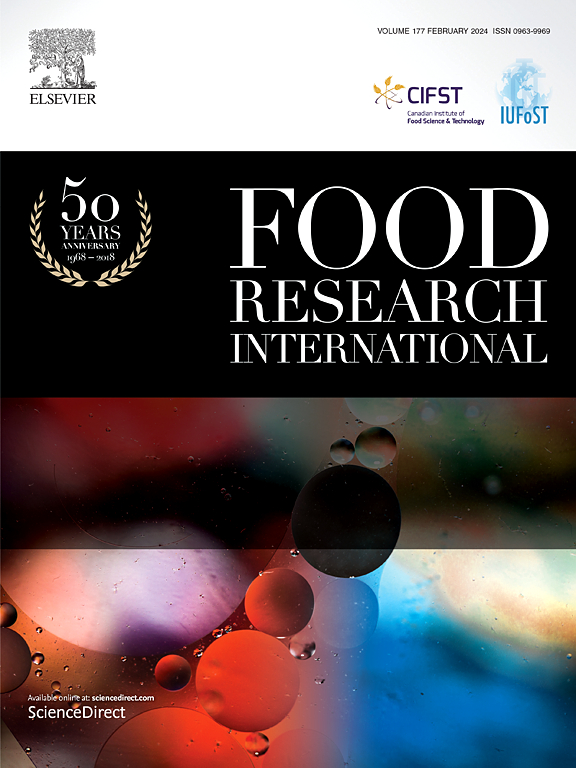南极磷虾肽的制备、独特结构特征及免疫调节作用
IF 7
1区 农林科学
Q1 FOOD SCIENCE & TECHNOLOGY
引用次数: 0
摘要
海洋多肽的免疫调节潜力越来越受到人们的关注。本研究通过免疫抑制和细胞模型研究南极磷虾肽(AKP)独特的结构特征和免疫调节作用。AKP能促进脾淋巴细胞增殖和巨噬细胞吞噬,减轻环磷酰胺引起的肠道损伤。分离纯化了AKP中活性最高的肽段,鉴定出两种免疫调节肽FDYGAN和ESDLYDYPWQ。分子对接研究表明,这些肽能有效地与TLR4和MHC-II受体的结合位点相互作用,两者的结合能在−5.0 ~−10.0 Kcal/mol之间。这两种肽均能显著激活巨噬细胞,增强吞噬活性和一氧化氮分泌,同时通过增加白细胞介素-1β (IL-1β)、白细胞介素-6 (IL-6)、白细胞介素-10 (IL-10)和肿瘤坏死因子-α (TNF-α) mRNA和蛋白水平的表达来调节细胞因子谱。FDYGAN在10 μg/mL和200 μg/mL浓度下的增殖和吞噬作用最强,分别为121.34%和153.36%。这项研究强调了AKP作为一种增强免疫健康的功能成分的潜力。本文章由计算机程序翻译,如有差异,请以英文原文为准。
Preparation, unique structural characteristics and immunomodulatory effects of peptides from Antarctic krill (Euphausia superba)
The immunomodulatory potential of marine peptides has gained increasing attention. This study investigated the unique structural characteristics and immunomodulatory effects of Antarctic krill peptides (AKP) using immunosuppression and cell models. AKP could promote spleen lymphocyte proliferation and macrophage phagocytosis, while mitigating cyclophosphamide-induced intestinal damage. The most active peptide fractions of AKP were isolated and purified, leading to the identification of two immunomodulatory peptides, FDYGAN and ESDLYDYPWQ. Molecular docking studies showed that these peptides could effectively interact with the binding sites on TLR4 and MHC-II receptors and the binding energies of both were in the range of −5.0 to −10.0 Kcal/mol. Both peptides significantly activated macrophages, enhancing phagocytic activity and nitric oxide secretion, while modulating cytokine profiles with increased expression of interleukin-1β (IL-1β), interleukin-6 (IL-6), interleukin-10 (IL-10), and tumor necrosis factor-α (TNF-α) at both mRNA and protein levels. Notably, FDYGAN exhibited the strongest proliferative and phagocytosis effects, with values of 121.34 % and 153.36 % at concentrations of 10 and 200 μg/mL, respectively. This study highlighted the potential of AKP as a functional ingredient for enhancing immune health.
求助全文
通过发布文献求助,成功后即可免费获取论文全文。
去求助
来源期刊

Food Research International
工程技术-食品科技
CiteScore
12.50
自引率
7.40%
发文量
1183
审稿时长
79 days
期刊介绍:
Food Research International serves as a rapid dissemination platform for significant and impactful research in food science, technology, engineering, and nutrition. The journal focuses on publishing novel, high-quality, and high-impact review papers, original research papers, and letters to the editors across various disciplines in the science and technology of food. Additionally, it follows a policy of publishing special issues on topical and emergent subjects in food research or related areas. Selected, peer-reviewed papers from scientific meetings, workshops, and conferences on the science, technology, and engineering of foods are also featured in special issues.
 求助内容:
求助内容: 应助结果提醒方式:
应助结果提醒方式:


